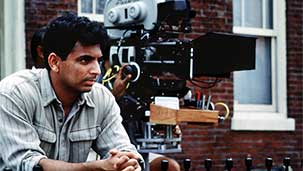Dear Aspiring Blockbuster Auteurs,
I’ve got some bad news for you. If you grew up hoping to be the next Hitchcock, Spielberg, Scorsese, or Tarantino – a director so bankable that your name alone could sell a film – those dreams died 1999. Simply put: if you didn’t make a name for yourself by the end of the Millennium, you officially outlived the era of Blockbuster Auteurs. Membership is officially closed. Sorry.
The end came unexpectedly. In fact, in 1999, anything seemed possible. Two parallel phenomena were sweeping Hollywood, both in the ever-maligned horror genre. First, The Sixth Sense burst into theatres as a crowd-pleasing critical darling. Through sophisticated tension, careful visual construction, and a delicious twist ending, writer-director M. Night Shyamalan was instantly heralded as a master architect of suspense. His barely-seen previous films (a family comedy starring Rosie O’Donnell, and a comedic coming-of-age story starring himself) were somehow irrelevant; The Sixth Sense proved that he was a director to watch out for. His unusual name became a talking point—not just among cinephiles, but by average movie goers who couldn’t wait to see what he’d do next.
On the other end of the spectrum came The Blair Witch Project, a gimmicky premise that was somehow turned into a bona fide blockbuster (and still the most profitable independent film of all-time). The found-footage film arrived at a perfect moment: the Internet was accessible enough to spread the word, but not sophisticated enough to de-bunk the hoax. The film’s success was predicated almost entirely on the chance that it might, maybe, who knows, actually be real. But for aspiring filmmakers, what it really meant was that anyone with a camcorder could potentially make a name for themselves.
It was a glorious time.
And then something happened. X-Men was released in 2000 and introduced a new, more socially-relevant, more earnest approach to blockbuster filmmaking. That success bred Spider-Man, and eventually a re-booted Batman series. Each of these films were directed by lauded filmmakers: Brian Singer, Sam Raimi, and Christopher Nolan, respectively. And in this unholy marriage of unique voices and familiar properties, a new formula for Hollywood success was born.
On the other end of the spectrum, it was a race to the bottom for low-budget break-out success. The wild rates of return experienced by the Saw and Paranormal Activity franchises made skittish studio executives gitty over mainstream genre exercises. And slowly but surely, the mid-range budgets that visionary directors normally found to grow the scale of their films and audience started to disappear. The gamble on talent became too rich for Tinsletown.
So by the end of the decade, the name of the director quickly took a backseat to the property being developed. Like Disney animation or MGM musicals, the brand of the studio replaced the brand of the director; the producers, and their long-term corporate expansion plans, became the visionaries who drove the storytelling. And now, in all the years that have passed since 1999, not a single new blockbuster director has emerged as a marketable talent for the average movie-going public to recognize and galvanize behind.
It sounds hard to believe, I know. But Peter Jackson brought us The Lord of The Rings in 2001, only after directing five other films. And though his LOTR trilogy was a massive success, his follow-up in 2005, King Kong (another established property), failed to pave the way for any bold or original future works. Even Michael Bay – a polarizing figure in cinema but undeniable audience magnet – shifted into franchise filmmaking with Transformers. Of course, other legacy name-brand directors like James Cameron, Tim Burton, and David Fincher continued their output, but no new names have been added beneath them on the list. Not a single Millennial director has captured the world’s attention the way M. Night Shyamalan last did.
Should we blame Shyamalan for this? Did he really burn his studios so badly with his subsequent string of mega-flops that they will never again try to build their brands on the back of a director? True, by the time he released Lady in the Water in 2006, his name was more of a liability than selling feature. But does that really explain why someone hasn’t taken up the mantle?
You might argue a case for a few names in comedy: Judd Apatow, Tyler Perry. But both come with big caveats. Apatow works more as a producer than director, and good luck getting your mom to name a film that Apatow has directed (my personal barometer for cross-over success). Perry is more of a niche success, like Wes Anderson, P.T. Anderson, The Cohen Brothers, or Woody Allen, even though starring in many of his films gives him better name recognition. After that, we get to names like J.J. Abrams, who works almost exclusively with other people’s franchises (Mission: Impossible, Star Trek, Star Wars). And those other unique voices we might have held out hope for? Ryan Johnson, Ryan Coogler, even Zack Snyder? They, too, find themselves at the mercy of the mega-franchise.
It’s sad. Devastating, really. We hear anecdotal stories all the time about directors like Steven Soderberg wanting to quit the business. But the theatres still fill up, and the studios are making more money than ever. So why do so many famous filmmakers paint a doom and gloom picture of a life making movies? It’s simple, really. And in a sense, it all comes back to M. Night Shyamalan. The man who re-invigorated Hollywood’s appetite for big budget auteurs may have also brought about their demise. How’s that for a Shyamalanian twist ending?
Sincerely,

Christopher







